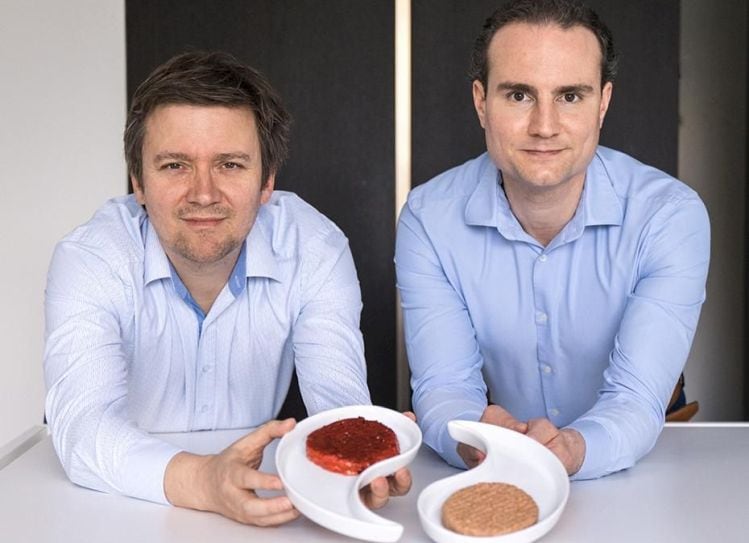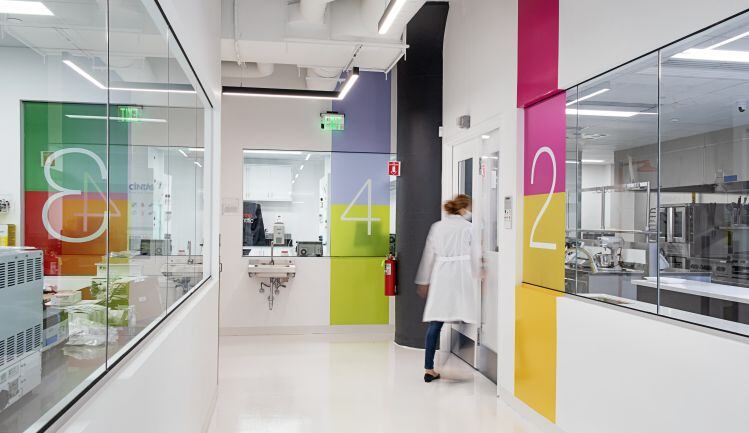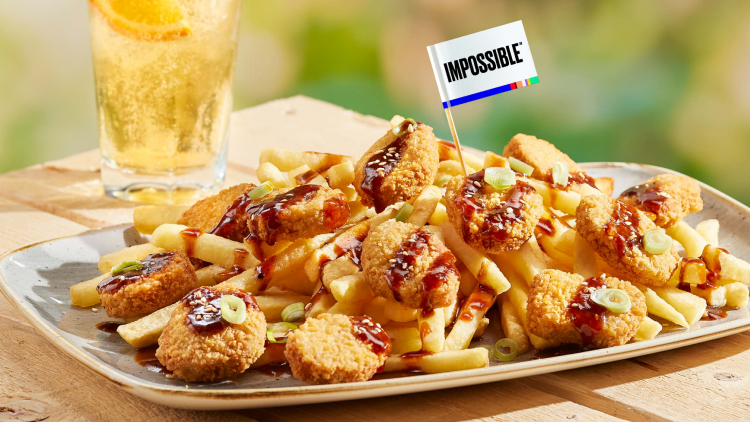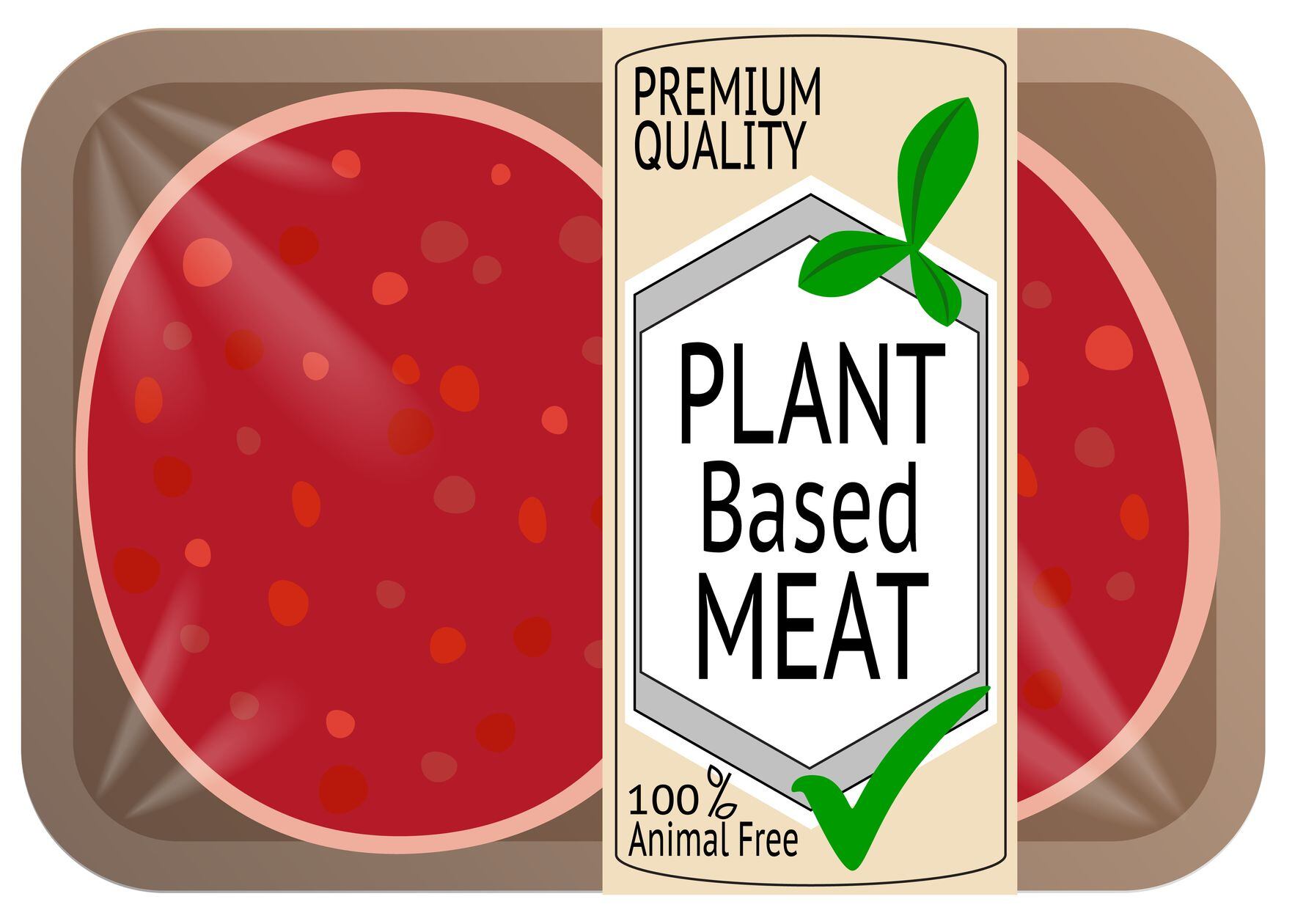Founded in October 2020 by Sanctorum and Andy de Jong, Paleo (tagline: ‘We make animal proteins, without animals’) emerged from stealth mode last month following the publication of a patent application outlining its precision fermentation approach to making the heme-binding protein myoglobin – an iron-rich protein found in animal muscle – that is bio-identical to the myoglobin produced by chickens, cows, pigs, sheep, tuna and mammoths.
The heme proteins from different species are all slightly different, with the mammoth myoglobin proving particularly intriguing, as when added to plant-based (soy) burgers and grilled, gas chromatography-mass spectrometry analysis showed an especially sharp increase in pyrazines, a class of volatiles that imparts a distinct roasted meaty aroma, said Sanctorum.
“On flavor on aroma and flavor, it's more intense.”
While not every plant-based brand is comfortable with adding animal proteins such as myoglobin to make their products meatier (even if they know it’s made by microbes, not animals), most brands in this space are targeting meat eaters looking to cut down on meat, rather than hardcore vegans and vegetarians, noted Sanctorum.
“Our myoglobin is bio-identical to what you find in in animals, but it's totally animal free, so I think it's perfectly suitable for vegans as no animals were involved in its production, although I know some might not want to eat it. But most of our potential clients are targeting flexitarians because they want that real meat flavor and experience.”
The GMO factor: Motif FoodWorks, Impossible Foods: Intracellular expression, heme proteins contained within the cell
So how does Paleo’s approach differ to that of Boston-based Motif FoodWorks (which makes bovine myoglobin, a heme protein marketed as ‘HEMAMI’) and San Francisco-based Impossible Foods (which produces soy leghemoglobin)?
All three companies are using synthetic biology/precision fermentation to genetically engineer a microbial host called Pichia Pastoris (a type of yeast) to eat sugars and produce iron-rich heme proteins that are used to impart more ‘meaty’ flavors and colors to meat alternatives.
The way these heme proteins are labeled and regulated, however, varies.
Impossible and Motif for example, have to crack open or ‘lyse’ their yeast cells when they are ready to harvest the protein, which is expressed inside the cells (intracellular expression).
This means that residual amounts of proteins from the genetically engineered yeast may end up in the final ingredient as it’s harder to separate the heme protein from the yeast during the downstream processing and purification stage.
As a result, as trace levels of recombinant DNA from the GM yeast may be detectible in the final heme proteins, they would be subject to the EU GMO regulation 1829/2003, and would also trigger bioengineered labeling in the US.
Motif FoodWorks, for example, told us that, “At this point we have been told that the product - because it has detectable DNA from the yeast used for fermentation - would require that customers using the ingredient would label under the National Bioengineered Food Disclosure Standard.”
Impossible Foods’ flagship heme protein, similarly, is subject to the EU’s GMO regulations (1829/2003) because low levels of the GM yeast are present in the final product.
Paleo: Extracellular expression, heme proteins secreted into fermentation tank
Paleo, by contrast, has engineered Pichia Pastoris yeast such that it secretes myoglobin (extracellular expression) out of the cell, which means it’s easier to separate the myoglobin from the yeast cells during downstream processing and purification, said Sanctorum, who is also testing other microbes for expressing myoglobins.
“It’s released outside the cell, so you can easily separate cells from the myoglobin. We’ve tested our heme proteins through PCR and there is no recombinant DNA whatsoever in our products.”
GMO-free??
This matters from a regulatory and labeling perspective on both sides of the Atlantic, explained Sanctorum, as it means that Paleo’s myoglobin is not subject to the EU’s GMO regulations (although it will be subject to the Novel Food Regulation).
“The legal distinction in Europe is if it's produced ‘from’ a GMO, which means it might contain recombinant DNA, or ‘with’ a GMO, as in our case, where the GMO is considered to be a processing aid.”
Similarly, Paleo’s myoglobin would not trigger bioengineered labeling in the US under the National Bioengineered Food Disclosure Standard, as there is no detectible recombinant DNA in the final product, he added.
As a result, Paleo is describing its myoglobin as ‘GMO-free,’ as it contains no GM yeast.
That said, Paleo’s heme proteins would likely not qualify for Non GMO Project Verified status in the US, as the standard prohibits any derivatives of ‘synthetic biology,’ and effectively prevents the new wave of ‘animal-free’ proteins, from casein and collagen to egg albumin or myoglobin, from using the butterfly logo, regardless of whether there is detectible recombinant DNA in the final product.
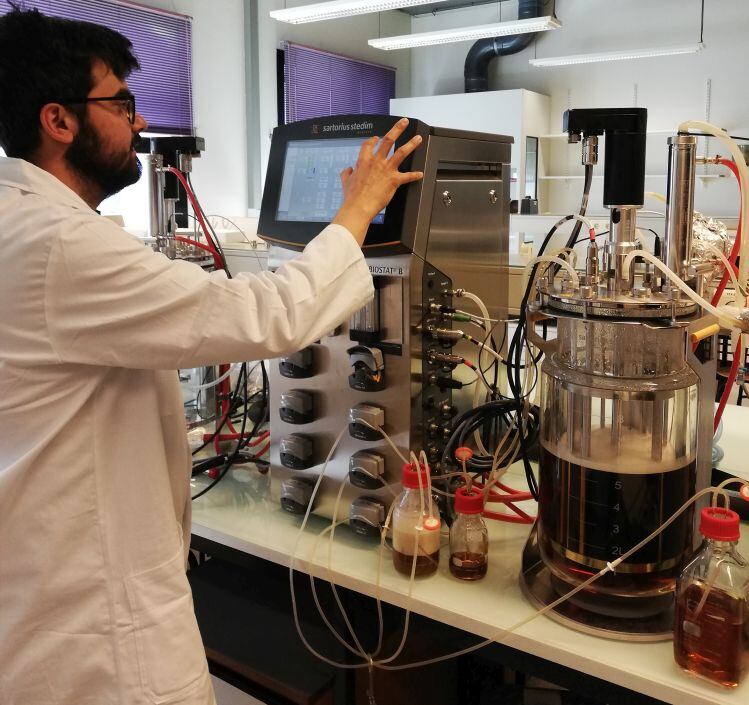
Feedstocks: ‘The carbon source needs to be available and cheap and produced in a sustainable way’
So what does the extra-cellular approach mean in terms of production yields?
“We don't know exactly, of course, the yields that others who use an intracellular approach obtain,” said Sanctorum, who raised $2.5m euros in seed funding and is currently seeking around 6-10m euros in a series A. “But we have quite high titers and we’re happy with what we have.”
He added: “We are currently in the process of scaling up. In our lab we have a 10-liter fermenter and for larger fermenters, we’re collaborating with the Bio Base Europe Pilot Plant. There are challenges as you scale up around nutrients, oxygen levels [in different parts of the tank] and other parameters, but we haven’t hit any hurdle yet that we that we haven’t been able to cross.”
As for feedstocks for the yeast cells, he said, “We’re testing different ones as the carbon source needs to be available and cheap and produced in a sustainable way.”
‘We are a European startup, but we realize that Europe is not going to be our first market’
Paleo is attracting interest from companies all over the world, claimed Sanctorum, and is currently assessing which markets to prioritize, including the US, where the first step would be putting together a GRAS determination. It might also involve a color additive petition if the myoglobin is sold as an uncooked product (it turns from red to brown during the cooking process).
“We are a European startup, but we realize that Europe is not going to be our first market for regulatory reasons, even though we’re not under the GMO regulations [Impossible Foods' soy leghemoglobin by contrast, is being assessed under EC 1829/2003 and will also be assessed as a food additive – read more here].”
Motif/Impossible heme IP dispute: ‘We’re following that but it doesn't impact what we're doing’
Unsurprisingly, Paleo – which has a team of seven - has been monitoring the high-profile IP dispute between Impossible Foods and Motif FoodWorks about the use of heme proteins in meat alternative products.
“We’re following that but it doesn't impact what we're doing,” claimed Sanctorum.” We did our analysis of freedom to operate, which was positive, and the GMO-free aspect also makes us unique in this space.
“We’re seeing a lot of interest because while companies we talk to have a lot of pride in their meat alternative products, there is a feeling that we're not there yet.”
Asked to comment on Paleo’s myoglobin, Motif FoodWorks told us: “We welcome all efforts to improve animal-free foods that benefit people and the planet. Imitation is the greatest form of flattery – our HEMAMI was first bovine-myoglobin to market and to receive GRAS approval from the FDA.”

